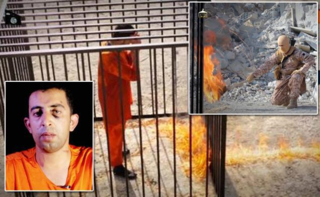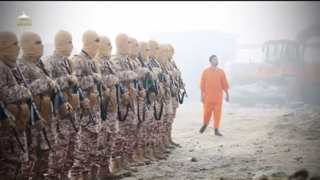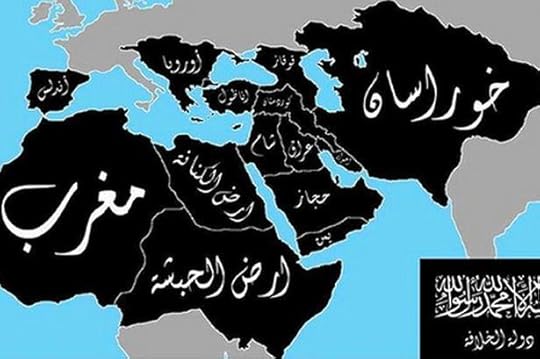John Robb's Blog, page 13
February 13, 2015
ISIS isn't the long term problem, Saudi Arabia is
Here's a new way to think about something that should be obvious...
To the politicians in DC and financiers in New York, Saudi Arabia is an island of stability in a sea of chaos. A reliable ally, willing to keep the oil flowing, year in and year out. A place that's not vulnerable to the instability that routinely guts the countries around it.
Of course, that line of thinking is utterly misguided. The opposite is true.
In reality, Saudi Arabia is extremely fragile and much of the chaos we see in the Middle East is due to the way Saudi Arabia avoids falling to pieces. Worse, we are largely to blame for this. We go along with this charade, and our willingness to play along is doing much of the damage.
To understand why this illusion Saudi stability is so toxic, let's dig into a very smart idea from thermodynamics called dissipative structures. In fact, the idea was so good that won Ilya Prigogine the Nobel prize in Chemistry. Prigogine's idea provides us with insight into how everything from how biological structures (e.g. bacteria, apes...) to natural phenomena (e.g. tornadoes) to social systems (e.g. nation-states) build order and prevent collapse.
The important part of this idea for us, is that all dissipative structures grow by exporting or expelling waste products into an external environment. In other words, they achieve "order" by getting rid of the disorder produced by building it.
Here it is in very simple terms. Within biological structures, eating produces the energy needed to build and maintain an organism. In turn, consuming food produces disorder in the form of feces. Organisms expel feces into the outside world because holding onto it is dangerous. The same process is true with almost all complex structures. With automobiles, it's exhaust fumes. With complex social systems, it is everything from warfare to pollution.
We could spend all day on this idea, but let's cut to the chase and apply this framework to Saudi Arabia. Saudi Arabia is a particularly expensive dissipative structure because it is extremely rigid, anachronistic, and unchanging. To maintain this archaic structure despite the titanic forces of globalization trying to pull it apart, it must export an incredible amount of disorder (entropy) into the surrounding region. Disorder such as:
A corrosive fundamentalist ideology. The KSA's Wahhabism fuels both ISIS and al Qaeda and it's spent billions spreading it around the world.
Thousands of violent zealots. The vast majority of the hijackers during 9/11 were Saudi as well as thousands of ISIS members. People it can't control are sent abroad.
Billions in destabilizing financing. Saudi Arabia provided the start-up funding for both al Qaeda and ISIS. It even "invested" $10 billion in the current Egyptian military dictatorship.
Obviously, this Saudi entropy has damaged everyone in the world. It spreads violent instability throughout the world, from the terrorism of 9/11 to the violent ascent of ISIS in Syria, Iraq, Libya, Egypt, Pakistan...
Worse, the damage being done by Saudi Arabia is increasing with each passing year, as it attempts to defy the inexorable gravitational attraction of a fluid, dynamic, and tightly integrated global system.
This means that even if ISIS is defeated in the next couple of years, Saudi Arabia's dysfunctional system will produce something worse soon thereafter.

February 9, 2015
John Boyd (Patterns of Conflict)
Thanks to Jason Brown. He converted these from BETA tapes located in the Marine Corps University archives.
via The Boyd Blog
The late, great John Boyd in action.
PS: Here's more videos of Boyd in action.
February 8, 2015
Jordan's Next Move May Be Fatal
The US defense establishment believes that the ISIS video of the Jordanian pilot was a miscalculation. I believe this is false. Here's why:
The establishment believes the video was meant to coerce. To scare the Kingdom into neutrality. Instead, it backfired, and the King of Jordan vowed a "relentless" war against ISIS. << This is an interesting narrative, but that's not what happened.
Instead, ISIS used the video to provoke Jordan. ISIS selected the punishment (it was insulting) and the victim (he was the son of a politically important tribal chief) with care. This implies that the video was meant to produced outrage, not coercion. ISIS did this to provoke Jordan into rash actions that it could take advantage of.
This is already happening. For example: Jordan's retaliatory air strike on ISIS turned into a PR failure when ISIS claimed it had killed a western female hostage by mistake. NOTE: this suggests that ISIS has a much faster OODA loop than the coalition.
Jordan Fights Alone
ISIS understands something that most of the suits in the US security system don't. Despite the constant rhetoric out of Washington, there isn't really a western coalition against ISIS. The west isn't part of this fight, nor will it be for some time to come. This means that if Jordan fights ISIS, it will do so alone:
The US will send Jordan a smattering of weapons, money, intelligence, and trainers. The US won't send ground troops, despite the fact that Obama recently made a request for authorization to use force against ISIS.
On the ground, all Jordan can expect, is some help from random Syrian, Kurdish and Iraqi militias. That's it.
On the battlefield, the west's only contribution will be a scattershot, low intensity air bombardment. A contribution that is insufficient for an enemy this large, complex, and dangerous.
Jordan's Next move may be Fatal
Even isolated and alone, Jordan is a tough nut for ISIS to crack. So, for ISIS to defeat Jordan, it needs Jordan to make a strategic mistake and this video was intended to force this mistake. For example:
Jordan joins the Syrian civil war in order to fight ISIS. Jordan gets sucked into the Syrian quagmire and becomes destabilized.
The Kingdom makes a bold incursion into ISIS held territory with an elite maneuver unit. This vehicle heavy unit, built along western lines, would be very dependent on supplies but would be able to advance quickly (aka get itself into trouble quickly). To capitalize on this, ISIS would feint a retreat to entice the Jordanian unit deep into ISIS territory in search of a decisive (revenge fueled) engagement. When the Jordanians get deep enough => ISIS would mount a defense, tie up the unit, and swarm its long supply line. Isolated, deep in enemy territory, and swarmed by fanatics => the Jordanian unit would be quickly routed and the captives executed. Panic would spread like wildfire.
Jordan cracks down on ISIS and al Qaeda supporters within the country and roughs up the massive refugee population living there (for example; over 800,000 Syrians are refugees in Jordan). This creates dissent that ISIS can use. These restive populations become particularly useful if battlefield defeats (see above) weaken, panic, and bleed the Kingdom's Bedouin aristocracy.
February 4, 2015
ISIS targets the Pilots of the Airwar
ISIS executed (burned to death) a Jordanian pilot this week. To maximize the impact of the event, ISIS released a slickly produced video of the event. The video was a "complete trial" that included >>
An interview with the pilot (the "testimony").
Some footage of western airplanes blowing things up (the "crime").
The brutal execution of the pilot (the "punishment").
Censorship as a Non-Strategy?
What was the west's response? Censorship. Here's a full version of the video I've found (it won't last long). The US government is putting on Web hosts around the world to remove videos like this. So, it will be censored and removed soon. Censorship isn't a smart strategy.
Censorship turns the video into "secret knowledge." Accessing it in defiance of dictates of a state adds to its allure, particularly for young people targeted by ISIS.
Censorship displays a complete misunderstanding of how online discussion works. IF it had been allowed online, it would have ignited tens of thousands of discussions required to turn this into learning event.
Censorship gives the impression that the West is weak and in retreat. The danger is that weakness invites aggression.
ISIS targets the Air War
The ex CIA/DoD guys on the major media networks, didn't have much to say about the event. Here's some more thinking:
Media: ISIS is mindlessly brutal. JR: a more insightful analysis shows that these brutal punishments (Christians would call them "old testament" punishments) are taken from the pages of the Quran. They are specifically selected to recruit Muslims schooled in scriptural literalism by pointing out that modernist Islam ignores scripture when inconvenient. This punishment was specifically selected for its brutality because the "crime" was push button bombing (the US claims this air war has killed ~6,000 members of ISIS).
Media: This execution was unjustified. The pilot was innocent. JR: The video spent quite a bit of time justifying the execution. In parallel, ISIS tied the morality of airstrikes to the morality of suicide bombing by offering to trade the pilot for some prisoners in Jordan. That was successful, Jordan confirmed this connection by immediately executing these prisoners in retaliation for the death of the pilot.
Media: ISIS wants to intimidate the west. JR: Not really. ISIS had a more specific target in mind. They are trying to intimidate the pilots of the air campaign. At the end of the video, ISIS offers 100 Gold Dinars (~$18,000) for the heads of specifically named Jordanian pilots they consider criminals. By personalizing this, they have just pierced the veil of anonymity that protects the pilots that make push button air warfare possible.
PS> Fox video has the full video up.
February 2, 2015
While ISIS Melts the Map, the Pentagon Fiddles
I've spent the last month writing about the inevitable collision between ISIS and Saudi Arabia. Here are some of the articles:
Saudi Arabia plunges into an Abyss
Abdullah is dead. ISIS will head south.
ISIS is the ideological successor Saudi Arabia
As I dug in, it's become clear to me and many of you I hope, that ISIS has the potential to melt the map of the Middle East by absorbing portions of Iraq, Saudi Arabia, Syria, Jordan, and Yemen.
Further, the deeper I dug into the evolution of ISIS and the vulnerabilities of Saudi Arabia, the more I found the melted map outcome to be likely.
Obviously a partially melted map is an extreme outcome, particularly once Saudi Arabia (Mecca, Medina and Oil) is gobbled up.
In fact, this outcome is so extreme, it makes it the most compelling topic of military study since the cold war ended (al Qaeda was just a warm-up and cyber is a sideshow), and also obviously something that we should be pulling out the stops to figure out.
This is why I found this announcement perplexing:
 The chairman of the Joint Chiefs of Staff has established a research and essay competition in honor of King Abdullah, to be hosted by the National Defense University. Announcing the creation of the competition on Monday, Chairman of the Joint Chiefs of Staff Gen. Martin Dempsey said it is a fitting tribute to the life and leadership of King Abdullah.
The chairman of the Joint Chiefs of Staff has established a research and essay competition in honor of King Abdullah, to be hosted by the National Defense University. Announcing the creation of the competition on Monday, Chairman of the Joint Chiefs of Staff Gen. Martin Dempsey said it is a fitting tribute to the life and leadership of King Abdullah.
“This is an important opportunity to honor the memory of the king, while also fostering scholarly research on the Arab-Muslim world, and I can think of no better home for such an initiative than NDU,” Dempsey said in a statement announcing the competition.
When I first read this, I thought it was a joke from the Duffle Blog. It's not fake, it's real.
Unfortunately, it's another depressing example of how misguided and dogmatic US military thinking has become.
Instead of:
figuring out why ISIS is an ideological and military threat to the Kingdom, or
what would happen if the Kingdom were to fall quickly, or
how to avoid all of this mess in the most adroit way possible....
...our military thinkers are writing paeans to a dead medieval monarch.
Apparently, if Saudi Arabia does fall, everyone in the US military can say whocoudaknowd? (the same thing the idiot savants on Wall Street said in 2008).
February 1, 2015
Exploiting the Robocaller Gap
Here's an interesting US systempunkt -- a systempunkt is the point in a big network where even a small attack would cause the entire network to fail. This systempunkt would enable a prepared individual the unique ability to shut down a large part of the US without shedding a drop of blood. For example, this attack has the ability to:
Put any company into a complete panic in less than an hour.
Generates hundreds of false arrests and armed police searches -- all done with a high risk of fatal injury.
It even has the ability (with some careful planning) to shut down all US schools (k-12 and colleges), hundreds of airline flights, and many government offices for a couple of days.
Auto-dialing Panic
How is an attack like this possible? It's possible due to a flaw in the US communications system (due to corporate corruption), new tech (not really new, but cheaper and more ubiquitous), and an overly sensitized population. These combine to make it possible for anyone to send threats and other misleading messages to thousands of specific people and organizations in a very short period of time, and in a way that minimizes capture. Here's more detail:
Robocalls with voice threats/misinformation. The attacker uses phone based marketing software to auto-dial hundreds of target numbers to deliver threatening and misleading audio messages (bomb threat, impending attack, shots fired, armed intruder seen). NOTE: This software is highly configurable so specific voice messages (human voice) can be delivered to specific numbers. Also, since it costs almost nothing to make these calls (rates and software cost) and this software can deliver messages (hundreds per phone per hour), it's possible to tackle targets of nearly any scale.
Economic Corruption (amoral companies). Fortunately for the attacker, there's no system in place to stop this from happening. The phone system is completely open to short term manipulation. NOTE: We see this every day. Most US households (particularly elderly households) get slammed with a half dozen robocalls (many of them are dangerous scams from abroad that attempt to defraud them of every penny they have) every single day. Despite the damage this does, the US phone monopolies won't do anything about it. Worse, the system is so badly managed, it's even possible for robocalling software to manipulate the "caller ID." This makes it possible for attackers to spoof targets with fake "Police Department" to "local" caller IDs.
Extreme reactions. Based on a phone threat alone, nearly all US schools and all government offices will evacuate and send home their personnel. Further, the ability to configure threats to specific locations and attach fake caller IDs provides the ability amplify and extend the duration of these evacuations and armed responses.
What does this mean?
Warfare is in transition. New tech and new threats are emerging every day. In many cases, simply doing the right thing (in this case, protecting US households from phone scams/spam), can blunt the effectiveness of the attack. In others, it takes an understanding of where modern warfare is going (not where it has been) in order to anticipate these threats and tweak the system in ways that blunts their potential for damage.
Unfortunately, I don't see this happening. The governmental and economic system we have isn't that good at doing the right thing. Worse, the security system we pay so much for, is only good at stopping the repetition of the types of attack that have already happened, not the attack that will happen. Why? Our national security system is simply unwilling to study warfare seriously.

PS: Robocalling software is very easy to acquire and run now. There are even smartphone apps that can do this on stolen phones.
January 30, 2015
The Cost of Ignoring Military Innovation
For all the “4th Generation of War” intellectuals running around today saying that the nature of war has fundamentally changed, the tactics are wholly new, etc, I must respectfully say … “Not really”: Alex the Great would not be in the least bit perplexed by the enemy that we face right now in Iraq, and our leaders going into this fight do their troops a disservice by not studying (studying, vice just reading) the men who have gone before us."
Gen. James Mattis - 2013.
Gen. Mattis is right in that it's important to learn from the history of warfare. I do that whenever possible. For example, a decade ago, I wrote this essay on how Alexander the Great defeated the Scythians (a "nation" of horse archers that wouldn't fight by the rules) and how that insight could be adapted to Iraq.
However, unlike the General and many others with military backgrounds, I don't believe that warfare has stopped evolving or changing.
To me, this resistance to change is both depressing and exasperating. I can't tell you how many times I've heard the "nothing is new in warfare" statement from otherwise intelligent people. That statement is plainly wrong. It's a cop-out. A way to avoid adapting to new circumstances.
In fact, the history of warfare is the best argument against this wrong-headedness. It's a history that is full of innovation, crafty adaptations, and creative endeavor. This record of achievement is precisely why military history is worth reading.
However, I'll readily admit I'm in the minority on this.
Most people don't believe warfare is a serious area of study. This attitude is why the study of warfare isn't taken seriously in academia and why sociologists, political scientists, historians, economists, and area experts all claim ownership of it. It's why intelligence and foreign policy experts routinely discount the role of military theory in their analysis.
A major reason for this? The study of warfare is NOT seriously supported by the military. Even the places where study should occur -- the academies, the war colleges, and speciality offices (like the DoD's Office of Net Assessment) -- don't support a true study of warfare.
This dismal situation isn't limited to the US. It's epidemic in the developed world. It's gotten so bad that every military innovator is quickly turned into a pariah (Boyd, Lind, etc.) and the only refuge for new thinking are blogs like mine.
But in other places in the world, warfare is evolving.
It's changing and with every evolutionary adaptation the cost of our willful ignorance is going up.

PS: For many outside the military, the term: "military intellectual" is an oxymoron. Many believe that warfare is simple a prehistorical brutish contest. Nothing could be further from the truth.
PPS: If military theory hasn't changed, please oh please tell me when it stopped evolving. Give me the specific date when military history ended and repetition began.
January 28, 2015
JOURNAL: Did ISIS just enter Saudi Arabia?
There's a report out today that ISIS jihadis attacked a Saudi Arabian border outpost south of Rafha (a city in southwest Iraq). The guards fled and several dozen jihadis were able to "melt into the general population" of the nearby border town.
If ISIS is as entrepreneurial as I believe they are, their pivot south has been in the works for months. This means that rather than waste effort on further gains or holding ground in Kobane and Iraq, they shifted their best forces south to positions within striking distance of the Kingdom.
PS: If this is a full pivot, it's a monumental intelligence error that will be compounded as the situation develops.
Russia Hacks its way to Victory
Here's an interesting strategy that is in the near term adjacent possible. It is one of the few strategies that could make a relatively unknown hacker a multi-billionaire overnight.

____
Russia has been in the throes of a financial crisis since Saudi Arabia began driving down oil prices last fall. Until the Russians reverse this economic assault, Russia will remain weak and vulnerable. For example:
the ruble will remain in crisis,
European sanctions over Russian intervention in the Ukraine will continue to cause meaningful economic pain, and
Russian bonds will still be considered "junk" by the global markets.
Reversing the Pain
Of course, Putin does have one way out. He needs to increase the price of oil. But how? There's only one way to accomplish this quickly and easily; destabilize Saudi Arabia.  Fortunately for Putin, the tool necessary to do this (and make a fortune in the process) is readily available.
Fortunately for Putin, the tool necessary to do this (and make a fortune in the process) is readily available.
Russia has three great exports: oil, natural gas, and criminal hacking. To do this Putin needs to connect Russian criminal hackers with ISIS. Once they make the introductions required, things could move forward very rapidly while providing the Russian government copious plausible deniability. What would be the potential result? Here's one scenario:
Russian criminal groups would hack Saudi Arabia's northern border's defense grid (taking down radar towers, imaging systems) and the country's communications system (cell phones and military communications).
ISIS would then use the blackout to bring a couple of thousand jihadis across the border in one quick movement. ISIS would overrun isolated border outposts seizing equipment and routing troops. It would then move south (with a particular emphasis on the city of Arar in NW Saudi Arabia (it houses the command and control facility for the entire northern border).
ISIS expands as hacking/disorder continues. Direct attacks by ISIS with Russian hacking support disrupts Saudi oil production (etc.). Oil prices shoot to the moon. Russian hackers, ISIS, and the Russian government all make billions from the increase in the price of oil (both by going long on oil in the market and through the direct sales of product they produce).
Why a Saudi Hack is so Easy
The Saudis are the perfect target for hackers. It's hard to imagine a country with more vulnerable to cyberattack. Here's why:
Saudi defensive systems and infrastructure have been cobbled together from external contractors who often win their contracts by bribing the royal family. It's a motley collection of tools with lots of vulnerabilities.
Financially motivated guest workers do most of the real work in the Kingdom. These people are easy to bribe/coerce/etc. to get access to critical systems.
The Saudi government/military is extremely reliant on positive command and control. So, if you can isolate command and control from the troops/population, panic will rapidly ensue.
JR
PS: Some people would argue that this deal isn't possible. They point out that Russia is at war with jihadis like we are, which means they would never cut a deal with ISIS. My response? That's not a real problem considering the upside opportunity here. Russia is more than willing to cut deals with its enemies if it yields an big advantage. The infamous Molotov-Ribbentrop pact between the Soviets and the Nazis is a great example of this.
PPS: ISIS routinely hires outside experts (engineers, etc.) and buys technologically complex equipment (modular refineries) to take advantage of financial opportunity.
PPPS: I'm not going to be speaking at the DC Suits and Spooks conference next week.
January 26, 2015
Jihadi Entrepreneurs and the IPO of the Century
One of the most interesting aspects of ISIS? The diversity of their cash flow. They make money from tariffs to taxes to smuggling to oil production to hostage taking to the plundering of art/antiquities/etc..
This isn't your standard 20th Century terrorist group, yet they haven't built the bureaucracatic structures we expect of a nation-state.
They are something in between. Let's explore this a bit.
Nation-states are organizational constructs built to do one thing: to mobilize economies and populations for total war. In fact, nation-states were so good at doing that one thing, they've killed off all competitive systems of governance. To mobilize in this way, nation-states have built a plethora of ways to extract resources from the economies they dominate and bureaucracies to automate the process.
In contrast, terrorist and many guerrilla groups of the last Century were dependent on donations from nation-states and wealthy sympathisers. A dependency that reminds me of the famous line from the delusional Blanche DuBois -- "I have always depended on the kindness of strangers."
ISIS is somewhere in between these two extremes. It's an entrepreneurial organization consumed with finding innovative ways to make money. One that isn't tied down to territory, form of organization, or method of operation. It can change on a dime if it generates more funding.
This isn't completely new. ISIS is part of a trend. The return of an entrepreneurial, commercial approach to violence has been going on since 2004. Since then, we've seen lots of evolution in the marketplace.
For example, although private military companies were the early leaders in the return of commercial conflict (the number of contractors in Iraq outnumbered US military personnel), they were dependent on government financing. So, when that financing ended, they wilted.
In contrast, jihadi entrepreneurs have been on a roll. They've been innovating since the US left Iraq. They've found new sources of income from both conquered territory and black globalization, mastered the use of the Internet for marketing and networking, developed a form of fundamentalist Islam that provides group cohesion and appeal, and opportunistically taken advantage of regional weaknesses to acquire a huge amount of territory (with 8 million people in it).
However, despite its maturation as a start-up, ISIS still hasn't entered the big leagues. To do that, it needs to do one thing. It needs Saudi Arabia. Saudi Arabia offers one thing to the jihadi entrepreneurs that no other place can offer. It's not Mecca and Medina. Those holy sites, although extremely important to the cohesion and legitimacy of the jihad, come in a close second to the real goal.
To the jihadi entrepreneurs consumed 24x7 with making enough money to keep ISIS going, Saudi Arabia is the end game. Almost unlimited amounts of loot. A mountain of loot. Enough loot to finance the unlimited expansion the jihad. A chance to mint new Emirates by the boatload.
To these entrepreneurs, this is the IPO (initial public offering) of the Century. An event so financially fruitful it makes the IPOs of Google, Facebook, and all of their Internet brethren pale in comparison. Given this trajectory, the only question is when? When will ISIS pivot south and go IPO?
John Robb's Blog
- John Robb's profile
- 17 followers









